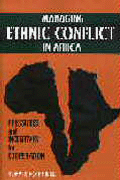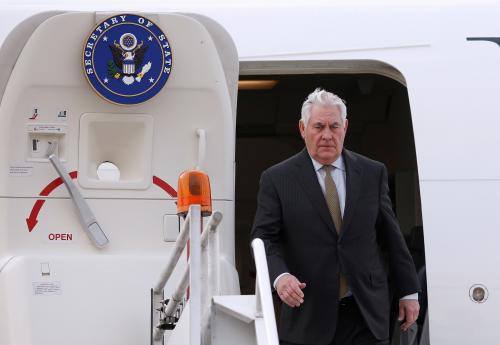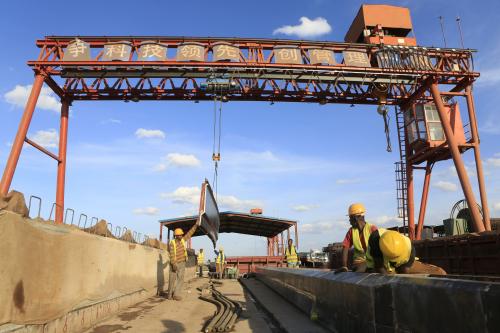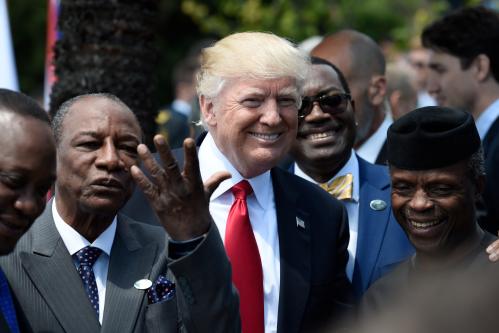Nigerian President Muhammadu Buhari visits U.S. President Donald Trump
On Monday, April 30, President Muhammadu Buhari of Nigeria met with President Donald Trump at the White House. Buhari is the first African head of state to visit the White House since President Trump took office.
Security topped the agenda for the two presidents, with Buhari thanking Trump for both the recent sale of military aircraft to Nigeria as well as “the physical presence of the United States military” in his country, largely for training purposes. Trump praised Buhari’s leadership against terrorism, especially Boko Haram, also stressing that “Nigeria was one of the first African nations to join the coalition to defeat ISIS, and Nigerian forces are currently leading regional efforts against ISIS in West Africa, and doing very well, as we have.”
However, the U.S.-Nigeria economic relationship was not forgotten. After their meeting, though touting the current relationship, Trump also acknowledged an imbalance, saying, “I’m pleased that Nigeria is one of our largest trading partners in the region, and we look forward to growing our trade relationship based on the principle of fairness and reciprocity. But we give Nigeria well over $1 billion in aid every year. And we have already started talking with the president about taking down the trade barriers—very substantial barriers to the United States trading with Nigeria. So we think that we are owed that… And we will be investing substantially in Nigeria if they can create that level playing field that we have to very much ask for, and maybe demand.”
Overall, the presidents’ conversation seemed positive and fruitful. One very welcome outcome of the meeting was the finalization of the repatriation of $500 million of stolen Nigerian funds hiding in U.S. banks. In addition, just before the meeting, in a sign of increasing U.S.-Nigeria relations, the Nigerian government announced that it would be building a new, $2 billion rail network with a consortium led by the U.S. company General Electric.
One cloud over the meeting was Trump’s alleged derogatory comments about African countries made back in May. When asked about it during a press conference, though Trump did not dispute it, even stating that many countries are in “very bad shape and very tough places to live in,” Buhari passed on the question, only saying “I’m not sure about, you know, the validity of whether that allegation against the president is true or not. The best thing for me is to keep quiet.”
Constitutional changes on presidential term limits ARE PROPOSED or PASSED in Chad, Burundi, and Comoros
This week, Chad’s parliament, in a vote boycotted by the majority of the opposition, approved a new constitution that will allow President Idriss Déby to potentially serve two more terms in office. Though the new constitution re-imposes a two-term limit that was eliminated in 2005, the new limits are not retroactive and thus will not affect Déby, who has been the president of Chad since 1990. The new constitution also increases the length of the president’s term from five to six years. It will abolish the position of prime minister as well as the constitutional council and high court of justice, further solidifying the power of the presidency.
On Tuesday, May 1, Burundi announced that its constitutional referendum to eliminate current presidential term limits will be held on May 17. If passed, it would allow President Pierre Nkurunziza to run for two more seven-year terms once his current term ends in 2020, potentially allowing him to stay in office until 2034. Already, Human Rights Watch has expressed significant concerns about political violence and anticipates an increase as the referendum draws closer. This week, the U.S. State Department also denounced the “numerous instances of violence, intimidation, and harassment committed against perceived opponents of the referendum,” and the erosion of democratic institutions in Burundi. The ongoing violence follows widespread protests and violence in 2015 after Nkurunziza won a third term as president.
On Monday, April 30, Comoros announced that it would hold a constitutional referendum on July 30 on presidential term limits. The referendum will change the constitution to allow presidents to run for two five-year terms instead of the current one. In addition, it would abolish the current provision dictating that political power in the country rotates every five years among the country’s three major islands of Grande Comore, Anjouan, and Moheli.
For more on political transitions in Africa, see the Africa Growth Initiative’s interactive African Leadership Transitions Tracker.
President Uhuru Kenyatta delivers State of the Nation, and Kenya implements minimum wage increase
On Wednesday, May 2, President Uhuru Kenyatta delivered his second term’s first State of the Nation address to parliament. President Kenyatta started his address by asking the Kenyan people for forgiveness “if there was anything [he] said last year that hurt or wounded [them].” He also asked the Kenyan people to join him in repairing the harm that has been done. Though not explicit, his comments addresses the recent political turmoil that surrounded Kenya’s last controversy-filled election. During the address, Kenyatta also praised the recent progress of Kenya’s economy, citing how its GDP growth of 4.9 percent in 2017 has outpaced both the world and sub-Saharan Africa real GDP growth of 3.6 percent and 2.6 percent, respectively. Kenyatta also vowed to strengthen the fight against corruption.
In other news, Kenya also announced a 5 percent minimum wage increase, a decline from the 18 percent increase workers received last year. The minimum wage increase was a response to various workers strikes held throughout the past year urging employers to increase their pay. Employers, especially in the manufacturing industry, did not support the increase. As Kenya Association of Manufacturers Chief Executive Phyllis Wakiaga argued, “A ceremonial wage increase will not help [them] tackle the subject of poverty eradication in a sustainable way.” Wakiaga feels the wage increase is not justified and could lead to manufacturers cutting workers. In contrast, the Kenya Association of Manufacturers suggests a reduction of value-added tax on everyday food items such as milk and sugar, as the key to improving workers’ purchasing power.










Commentary
Africa in the news: Buhari-Trump meeting, third termism spread, and Kenya updates
May 4, 2018